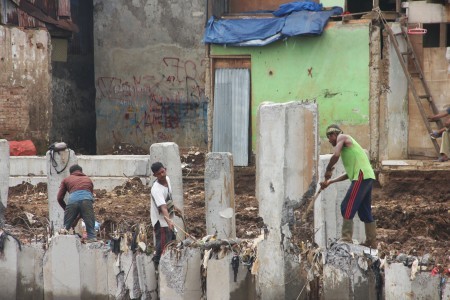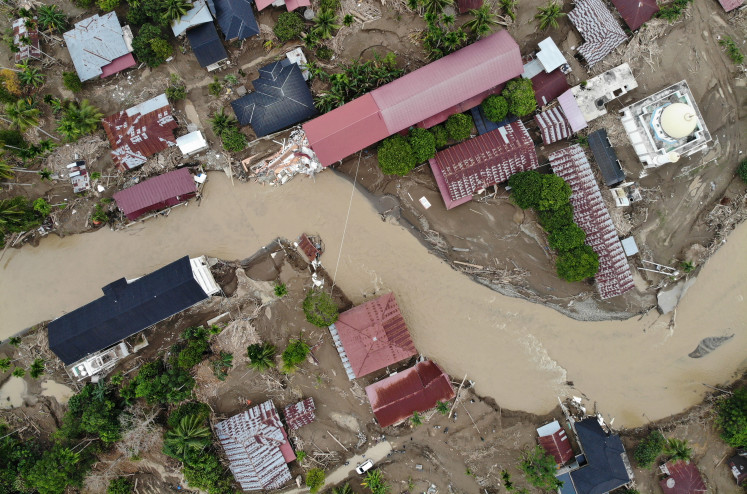Popular Reads
Top Results
Can't find what you're looking for?
View all search resultsPopular Reads
Top Results
Can't find what you're looking for?
View all search resultsUrban governance: Making the Jakarta Declaration work
The Jakarta Declaration was the main document coming out of the Asia-Pacific Regional meeting regarding the “New Urban Agenda.” Captioned “sustainable urbanization to accelerate development,” the document insinuates the growing recognition that urban areas, especially cities, are not “parasitic,” and if guided by appropriate policies can hasten sustainable development in the region.
Change text size
Gift Premium Articles
to Anyone
T
he year 2015 was a major milestone in global efforts toward sustainable urbanization and urban development. The Sustainable Development Goals (SDGs) as a framework for global development led to a new list of 17 goals, replacing the Millennium Development Goals.
For the urban community, the center of attention, celebrated as key reference to urban development, was SDG 11: “to make cities and human settlements inclusive, safe, resilient and sustainable.” Following this, attention has turned toward the UN Habitat”s global summit – Habitat III. Popularly known as the “New Urban Agenda,” Habitat III builds on recent momentum and enthusiasm to assert that it is “time to think urban.”
The Jakarta Declaration
The Jakarta Declaration was the main document coming out of the Asia-Pacific Regional meeting regarding the “New Urban Agenda.” Captioned “sustainable urbanization to accelerate development,” the document insinuates the growing recognition that urban areas, especially cities, are not “parasitic,” and if guided by appropriate policies can hasten sustainable development in the region.
Indeed, the recent report reveals the development of Asian and Pacific cities as evidenced by declining poverty rates, urbanization, economic growth and the rise of a certain “middle class” cohort. The Jakarta Declaration is replete with a lot of well-intended ideas, goals and suggestions.
The declaration advocates several key issues that appropriately reinforce the crosscutting nature of contemporary urbanization and the urgent need to plan for it.
In view of the socioeconomic, ecological and political challenges at stake, a succinct reflection is perhaps useful. For instance, several local governments are faced with immense financial deficits and traditional sources of funding coupled with weak internal revenue mobilization. This suggests that a lot of policies and projects will still stay in the books without actual implementation. Innovative funding through local investment, public-private partnerships and addressing the economic costs of corruption remain critical.
Furthermore, functional linkages between rural and urban areas have to be confronted to enhance holistic social and economic development. The question is not really about urban biases or urban centric policies. It is about effective urban governance, since urban and rural areas are in a continuum – a constant process of interdependencies critical to overall growth and development. There is no way one can develop without the other; effective urban development strategies have proven to assure rural areas of development prospects.
Within the highly significant issue of governance is political commitment, which the declaration advocates for. Too often development has been stalled by talks and policy formulation with little action. Politicians must now “walk the walk.” This requires collaborative governance that actively engages marginalized, vulnerable and underprivileged groups. Cities and urban areas require formidable, unrelenting and dedicated leaders to achieve results. Evidence from Porto Allegre and Curitiba (Brazil), as well as the once drug-ridden cities of Bogota and Medellin (Colombia), advance the argument that true leadership and governance gives birth to strong urban economies and efficient, sustainable cities.
The constant threat of disaster positions climate change adaptation as a crucial area of concern. High population densities, the growth of informal settlements and the location of populations in environmentally hazardous areas imply the need for urgent responses. Sustainability questions take center stage, followed by ambiguity over what has to be done and who does it. Thus, inherently promising strategies are disjointed, uncoordinated and less inclusive.
Since the poor and marginalized are highly vulnerable to climate change effects, mechanisms for initiating strategies and responses must emerge from these deprived places, rather than from local and national government offices. If not, progress toward adaptation runs the risk of failure in terms of local suitability, support and cooperation and effectiveness.
Declarations that work: A case for ‘radical’ urban governance?
It is noteworthy that declarations do not create changes – they initiate them. Several of the issues in the Jakarta Declaration or the draft of the New Urban Agenda are neither new nor revolutionary. They are issues that keep coming back to the discussion table due to their growing intensity and frequency in daily urban life. It suggests a lot more has to be done, or perhaps that little has been achieved from past efforts.
For declarations to work they must be localized. Real changes are effected at the local level where residents can both see and feel an impact on their lives and communities. Even if most residents do not study the policy, or even know about it, they could at least attest to the successes or failures of it.
Governance must begin on the streets. Local authorities should locate people, study them, engage them and know their views and priorities before allowing them to lead a process toward sustainable changes in their communities. Effective governance is one that is grounded in urban communities, in public life and in places where those who are marginalized and forgotten live. This sort of governance does not wait for people to come to their local offices, but instead goes to them.
Radical urban governance goes beyond this. It concerns a sort of leadership where leaders are willing to risk political votes for what works for the people. It requires a commitment to turn the status quo upside down. It requires the ability to confront corruption without regard for political and ethnic tags.
In Indonesia, there is the emergence of the four pillars of progressive urban governance – the four cities of Jakarta, Bandung, Surabaya and Medan – where the seeds of urban governance that can accelerate local development are being sown. In Thailand and India, there have been several success stories by local federations and civil society.
One crucial point that cannot be overemphasized is that although international and national agendas are useful, the real battle for development and progress will be won or lost at the local level: cities, urban areas and small communities. There is therefore the need for a stronger civil society, democratic institutions that are held accountable and an engaged public, all of which would allow for the realization of goals in accelerating sustainable urban development for all.
***
Seth is a Development Planner and currently a MEXT PhD Scholar at Osaka University, Japan. He holds an MSc Urban Planning and Policy Design from the Politecnico di Milano, Italy and Crises Management and Disaster Response certificate from BBK Academy Germany. Seth Asare Okyere was also the recipient of the Konosuke Matsushita Memorial (Panasonic) Foundation young researcher grant Award in 2015. His professional and research interests are in the areas of urban development and policy and informal urbanism.
---------------
We are looking for information, opinions, and in-depth analysis from experts or scholars in a variety of fields. We choose articles based on facts or opinions about general news, as well as quality analysis and commentary about Indonesia or international events. Send your piece to community@jakpost.com. For more information click here.










